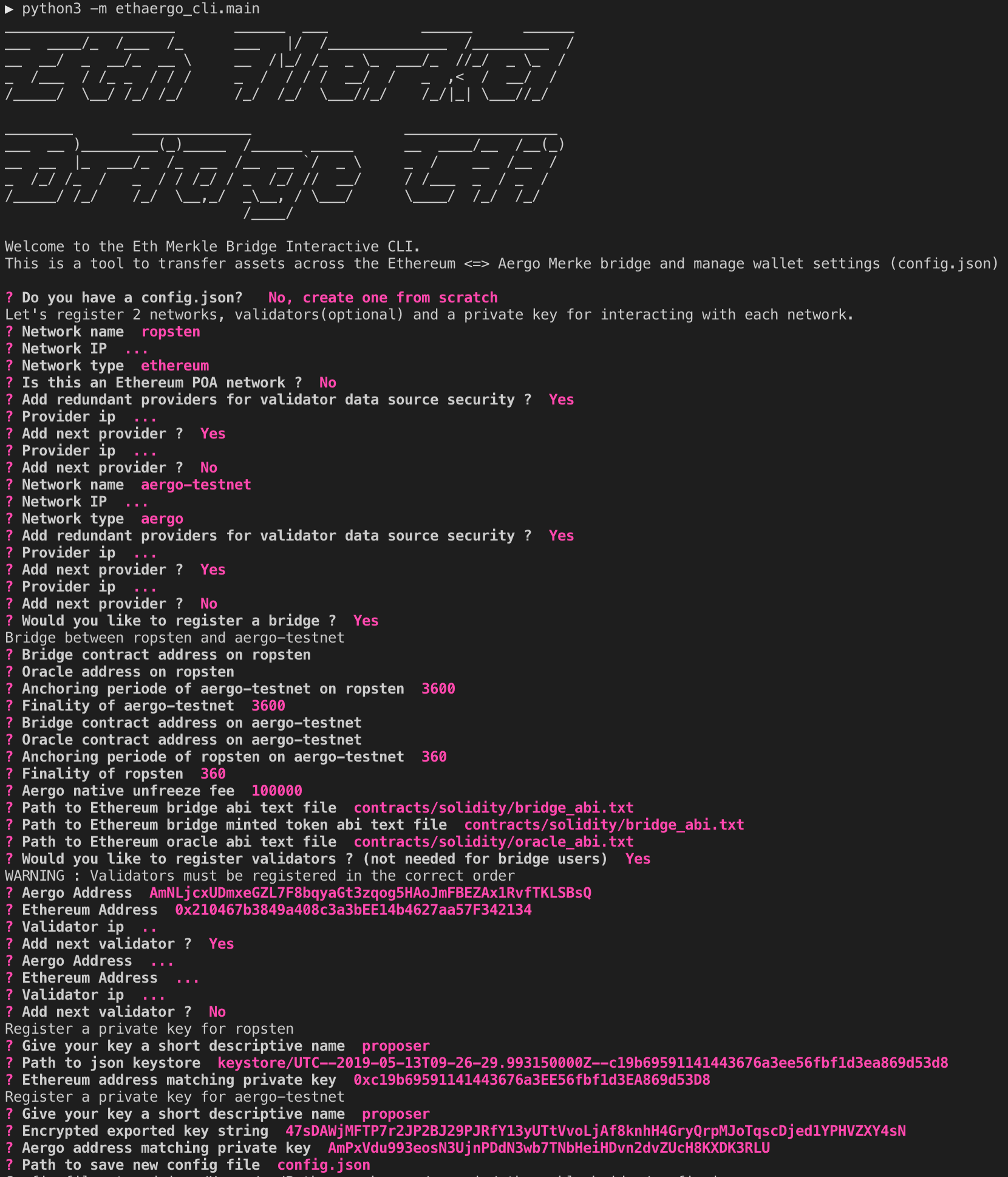Deploying a new bridge¶
Process¶
1- Each Validator generates a private key and address to sign bridge messages (anchors, settings update…) and shares the address and validator ip with the bridge Proposer.
2- Proposer creates a config.json file draft. (See Create a new config file below).
3- Proposer deploys the eth-merkle-birdge.sol and eth-merkle-bridge.lua contracts (See Deploy the bridge contracts below).
4- Proposer deploys the oracle.sol and oracle.lua and transfers bridge controle to oracles (See Transfer control of the bridge to the multisig oracle below).
5- Proposer removes his private key registered in config.json, and shares config.json with Validators.
6- Each Validator adds his private key to his config.json.
7- The Validators start validating (see validator docs) with the correct validator index (see position of validator in config.json).
8- Proposer starts operating the bridge (see proposer docs).
Deploy the bridge contracts¶
The sender of the deployment tx will be the bridge owner. Ownership is then transfered to the multisig oracle.
$ python3 -m ethaergo_bridge_operator.bridge_deployer --help 18h17m ⚑ ◒
usage: bridge_deployer.py [-h] -c CONFIG_FILE_PATH -a AERGO -e ETH
[--privkey_name PRIVKEY_NAME] [--local_test]
Deploy bridge contracts between Ethereum and Aergo.
optional arguments:
-h, --help show this help message and exit
-c CONFIG_FILE_PATH, --config_file_path CONFIG_FILE_PATH
Path to config.json
-a AERGO, --aergo AERGO
Name of Aergo network in config file
-e ETH, --eth ETH Name of Ethereum network in config file
--privkey_name PRIVKEY_NAME
Name of account in config file to sign anchors
--local_test Start proposer with password for testing
$ python3 -m ethaergo_bridge_operator.bridge_deployer -c './test_config.json' -a 'aergo-local' -e eth-poa-local --privkey_name "proposer"
DEPLOY MERKLE BRIDGE
------ DEPLOY BRIDGE BETWEEN Aergo & Ethereum -----------
------ Connect Hera and Web3 providers -----------
------ Set Sender Account -----------
> Sender Address Aergo: AmPxVdu993eosN3UjnPDdN3wb7TNbHeiHDvn2dvZUcH8KXDK3RLU
> Sender Address Ethereum: 0xc19b69591141443676a3EE56fbf1d3EA869d53D8
------ Deploy Aergo SC -----------
> result[CrbmTHjGLEdgtKF7zUicgPwTZMYuueiX76mu87w7U2YE] : TX_OK
------ Deploy Ethereum SC -----------
> Bridge Address Ethereum: 0xa146911F6779301D131139353960216D179693D6
> Bridge Address Aergo: AmhJjVxa7Yp8CiXpTXVhoDXiDa66SD6rsejbimPFNxzvPNbLzEg5
------ Store bridge addresses in test_config.json -----------
Transfer control of the bridge to the multisig oracle¶
The oracle_deployer script will deploy the oracle contract (with validators previously registered in config.json), and transfer ownership to the newly deployed contract.
$ python3 -m ethaergo_bridge_operator.oracle_deployer --help 18h17m ⚑ ◒
DEPLOY ORACLE
usage: oracle_deployer.py [-h] -c CONFIG_FILE_PATH -a AERGO -e ETH
[--privkey_name PRIVKEY_NAME] [--local_test]
Deploy oracle contracts to controle the bridge between Ethereum and Aergo.
optional arguments:
-h, --help show this help message and exit
-c CONFIG_FILE_PATH, --config_file_path CONFIG_FILE_PATH
Path to config.json
-a AERGO, --aergo AERGO
Name of Aergo network in config file
-e ETH, --eth ETH Name of Ethereum network in config file
--privkey_name PRIVKEY_NAME
Name of account in config file to sign anchors
--local_test Start proposer with password for testing
$ python3 -m ethaergo_bridge_operator.oracle_deployer -c './test_config.json' -a 'aergo-local' -e eth-poa-local --privkey_name "proposer"
DEPLOY ORACLE
aergo validators : ['AmNLjcxUDmxeGZL7F8bqyaGt3zqog5HAoJmFBEZAx1RvfTKLSBsQ', 'AmNLjcxUDmxeGZL7F8bqyaGt3zqog5HAoJmFBEZAx1RvfTKLSBsQ', 'AmNLjcxUDmxeGZL7F8bqyaGt3zqog5HAoJmFBEZAx1RvfTKLSBsQ']
ethereum validators : ['0x210467b3849a408c3a3bEE14b4627aa57F342134', '0x210467b3849a408c3a3bEE14b4627aa57F342134', '0x210467b3849a408c3a3bEE14b4627aa57F342134']
------ DEPLOY BRIDGE BETWEEN Aergo & Ethereum -----------
------ Connect AERGO -----------
------ Connect Web3 -----------
------ Set Sender Account -----------
> Sender Address Aergo: AmPxVdu993eosN3UjnPDdN3wb7TNbHeiHDvn2dvZUcH8KXDK3RLU
> Sender Address Ethereum: 0xc19b69591141443676a3EE56fbf1d3EA869d53D8
------ Deploy Aergo SC -----------
> result[7bATQt58yd64cYY7h8YUSvQoU6NLFB6SXDUnRD1x39Mx] : TX_OK
------ Deploy Ethereum SC -----------
> Oracle Address Ethereum: 0xF05692cE866f21b5E108781055AdEDde00E50872
> Oracle Address Aergo: AmgwgSFDwtdxzdfa4kUxuYXMWkHN1MLZMVANBcm85rpsDSaAymFU
------ Store bridge addresses in test_config.json -----------
------ Transfer bridge control to oracles -----------
Send native aer to the bridge contract¶
After deployment, the aer on the Aergo network should be sent (frozen) to the bridge contract so that it can be unfrozen when users send their erc20 from the ethereum network.
